Ultimate Guide to Cockatiel Care and Well-Being
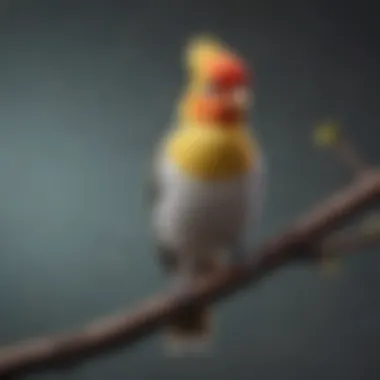
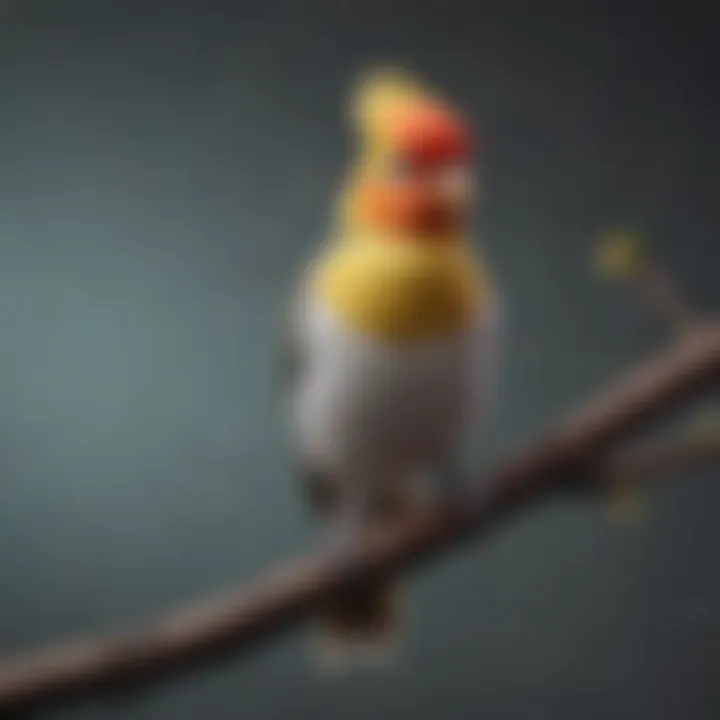
Intro
Owning a cockatiel can be rewarding, yet it comes with responsibilities. This guide serves to educate pet owners on the essential aspects of cockatiel care. It provides a clear view of their needs, behavior, and health to ensure these intelligent birds can thrive in a domestic environment. From the moment you welcome a cockatiel into your home, understanding their unique requirements is key to building a strong bond and ensuring their well-being.
Understanding Your Pet
Cockatiels are social creatures that require attention and care. Recognizing their behavior and specific needs can greatly enhance their quality of life.
Pet Behavior Basics
Cockatiels exhibit a range of behaviors. They can be playful and curious, often exploring their environment. It’s essential to spend time with them daily. They communicate through vocalizations, body language, and even feather movements. Understanding these signals helps owners respond to their needs effectively.
Common Breed Characteristics
Cockatiels are typically medium-sized birds, known for their charming crest and vibrant plumage. These birds are generally friendly and social. Each bird may have its distinct personality; some can be quite talkative while others may prefer a more reserved approach.
Species-Specific Needs
Ensuring that your cockatiel is well taken care of requires an awareness of its specific needs. They thrive in environments where they can socialize and explore. A proper diet, appropriate cage size, and stimulating toys are crucial for their mental and physical health.
Pet Care and Maintenance
Proper care and maintenance are critical for a cockatiel�’s well-being. This section details key areas of focus for pet owners.
Feeding Guidelines
Cockatiels require a balanced diet to maintain their health. A mixture of high-quality seeds, pellets, and fresh fruits or vegetables is ideal. Avoid offering them avocado, chocolate, and caffeine, as these can be toxic. Providing fresh water daily is also crucial.
Grooming Essentials
Regular grooming is necessary. Cockatiels need occasional nail trimming and beak care. Bathing them occasionally will help them maintain healthy feathers. A shallow bowl of water or gentle misting works well for their bathing needs.
Hygiene Practices
Keeping the living environment clean is vital. Regular cleaning of the cage, toys, and surrounding area helps prevent illness. Be aware of signs that might indicate the need for change, such as droppings outside the cage or uneaten food.
Training and Development
Training not only enhances a cockatiel’s behavior but also strengthens the bond with their owner.
Basic Commands and Skills
Teaching simple commands can be beneficial. Start with basic phrases and encourage your cockatiel to mimic. Consistency and positive reinforcement are key. Training can alleviate behavioral issues over time.
Behavioral Training Techniques
Use gentle techniques to shape behavior. Reward your cockatiel for desired actions. Avoid punishment, as it can create fear instead of learning.
Addressing Common Behavior Issues
It’s essential to address any behavioral problems promptly. Common issues include excessive screeching and biting. Understanding the root cause will help in managing these behaviors effectively.
Health and Wellness
Routine health care is vital for your cockatiel's longevity.
Routine Vet Check-ups
Regular veterinary visits are necessary for monitoring health. Your vet can provide vaccinations and advice on diet and care.
Vaccination Needs
Vaccinations help protect against common avian diseases. Discuss with your vet which vaccines are appropriate for your pet.
Recognizing Signs of Illness
Being aware of behavioral changes or physical symptoms can help you identify potential health issues. Look for signs like lethargy, changes in appetite, or odd droppings.
Enrichment and Activities
Providing enrichment and activities is essential for a happy cockatiel.
Indoor vs.
Outdoor Activities
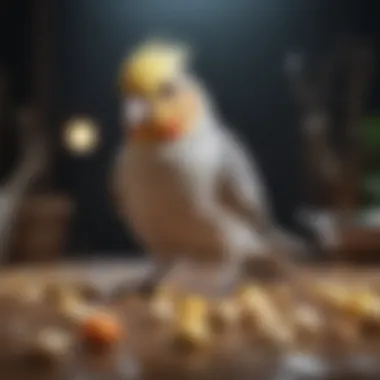
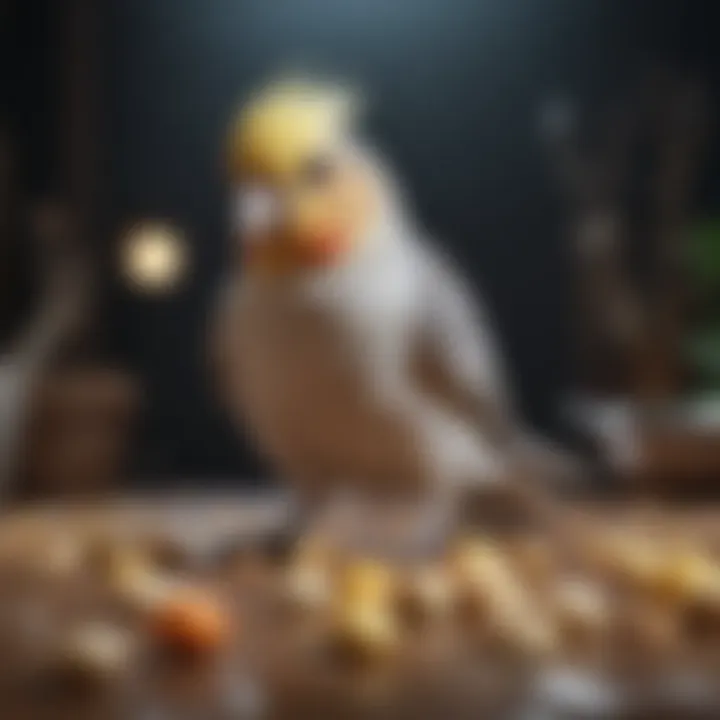
While indoor play is important, outdoor time can be beneficial too. Always supervise outdoor activities to keep your cockatiel safe from predators. Provide a variety of toys and perches within the home.
Interactive Toys and Games
Interactive toys stimulate the mind. Look for toys that require problem-solving skills, such as foraging toys or puzzle feeders.
Socialization Opportunities
Social interaction is crucial. Spend quality time with your cockatiel. Allow them to interact with family members and even other pets when supervised. Proper socialization leads to a more well-adjusted bird.
Proper care and understanding of cockatiel needs lead to a happier, healthier pet.
In summary, this guide outlines the necessary steps to ensure your cockatiel is well cared for. Understanding their behavior and needs will enrich both your lives and strengthen the bond you share.
Understanding Cockatiels
Understanding cockatiels forms the foundation of their proper care. These birds are known for their sociable nature, joyful chirping, and striking appearances. Grasping their characteristics and varieties is essential for any pet owner aiming to provide a nurturing environment.
Having this knowledge not only improves their quality of life but also enhances the bond between the cockatiel and its owner. Understanding their needs allows for tailored approaches to caregiving, which is crucial for their overall well-being.
Cockatiel Characteristics
Cockatiels possess distinct characteristics that make them unique companions. They generally weigh between 80 to 125 grams and have a life span of 15 to 20 years with proper care. One of the most notable attributes is their affectionate nature. Cockatiels often enjoy human interaction, seeking attention and companionship. Their lively personalities and playful antics can provide endless entertainment.
Social Behaviors: Cockatiels thrive in social environments. They often bond closely with their owners, exhibiting loyalty and affection.
Communication: These birds are known for their vocalizations. They produce whistles and chirps, often mimicking sounds from their surroundings. Understanding these sounds can provide insights into their moods and needs.
Visual Characteristics: Cockatiels have a distinct appearance, often characterized by their crests, bright cheeks, and an array of color patterns. Standard colors include grey, white, and yellow, but many variations exist, including lutino and cinnamon.
Cockatiels are intelligent creatures that require mental stimulation. Their curious nature often leads them to explore their surroundings, making it vital to provide a safe space for them to roam.
Different Cockatiel Varieties
There are several varieties of cockatiels, each with its unique traits and characteristics. Recognizing these varieties can assist in choosing the right cockatiel for your home. Some of the most popular types include:
- Grey Cockatiel: The most common variety, featuring a grey body with orange cheek patches.
- Lutino Cockatiel: This variety is notable for its striking yellow feathers and red eyes.
- Cinnamon Cockatiel: Exhibits a softer brown hue, making it distinct from the standard grey.
- Pearl Cockatiel: Known for its unique pattern on the feathers, giving it a speckled appearance.
When considering a cockatiel, understanding these varieties helps in making informed decisions related to care, feeding, and socialization. Each type has varying needs and personality traits that can impact their compatibility within a household.
Setting Up Proper Habitat
Creating a suitable habitat is crucial for the well-being of your cockatiel. A well-designed living space allows these birds to thrive. It supports their physical and mental health. Cockatiels are social and active creatures; therefore, their environment must cater to their needs.
Proper habitat setup enhances your pet's quality of life and strengthens the bond between you and your cockatiel. A comfortable living space encourages natural behaviors, such as playing and exploring. Ensuring your cockatiel has enough room to move freely is important. This will help prevent stress and associated health issues.
Choosing the Right Cage
Selecting the correct cage for your cockatiel is one of the most critical decisions you'll make. Your choice will impact how comfortable and happy your pet is. A suitable cage should offer ample space. Typically, a minimum size of 24 inches wide, 24 inches deep, and 36 inches high is recommended. Larger sizes are preferable, especially if you have more than one cockatiel.
The design of the cage also matters. Look for a cage with horizontal bars for climbing. Ensure the spacing between bars is no wider than ½ inch to prevent escapes or injuries. Consider cages made from safe materials. Avoid those with toxic coatings or finishes.
When looking for a cage, remember to check for adequate openings. A large door facilitates interaction and cleaning, which is essential for maintaining a healthy environment.
Cage Location and Setup
The location of your cockatiel's cage is vital. Place the cage in a high, but safe, area. Cockatiels enjoy being part of the family and can become stressed if isolated. Areas with natural light but not direct sunlight will be ideal. This can help regulate their temperature and mimic their natural habitat.
Avoid placing the cage near drafty windows or doors. Excessive cold or heat can harm your bird's health. Additionally, keep the cage away from kitchen areas. Cooking fumes can be harmful. Furthermore, consider the noise level. Cockatiels are sensitive to loud or sudden noises, which can lead to anxiety.
When setting up the cage, ensure there is room for your bird to move around freely. This involves arranging the interior thoughtfully. Include different perch heights. Also, facilitate easy access to food and water.
Essential Cage Accessories
Accessories are essential to create a stimulating habitat for cockatiels. Proper enrichment helps keep your bird engaged and entertained. Here are some key accessories to consider:
- Perches: Different sizes and materials help satisfy their natural desire to climb. Natural wood branches provide a more varied texture.
- Food and Water Bowls: Use sturdy, removable dishes. This makes it easier to keep things clean. Change water daily to ensure its freshness.
- Toys: Provide a mix of chewable and interactive toys. Rotate them every few weeks to maintain your bird's interest.
- Hiding Spots: Include cozy hiding spots with soft material. This gives your bird a sense of security.
- Cage Covers: Nighttime covers can help reduce stress by blocking out disturbances and promoting restful sleep.
In summary, a well-planned habitat with the right cage, location, and accessories plays a crucial role in your cockatiel’s happiness and health. By taking the time to set everything up correctly, you create an environment that supports both their physical needs and emotional well-being.
Diet and Nutrition
Diet and nutrition play a crucial role in the overall health and happiness of cockatiels. These birds require a balanced diet to thrive, and understanding their nutritional needs is essential for any pet owner. A well-rounded diet not only supports physical health but also influences behavior and mental well-being. Careful attention to what a cockatiel eats can prevent various health issues and enhance the bond between the bird and its owner.
Understanding a Balanced Diet
A balanced diet for a cockatiel consists of a variety of foods that provide essential nutrients. The foundation should include high-quality pellets specifically formulated for cockatiels. Pellets contain the necessary vitamins and minerals needed for growth and maintenance.
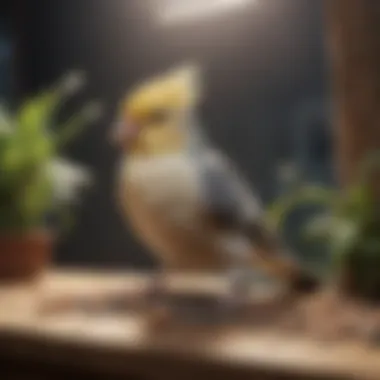
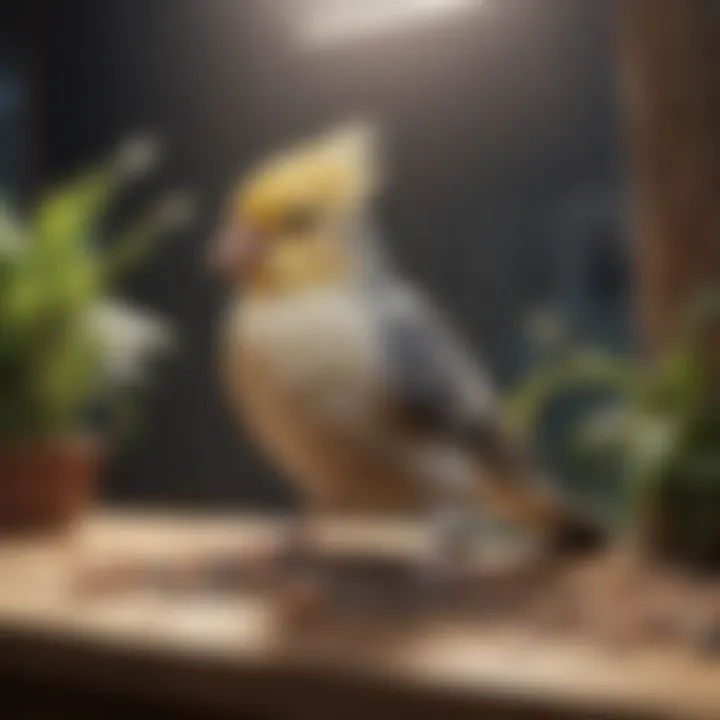
In addition to pellets, fresh foods are equally important. These include vegetables, fruits, and some grains. Dark leafy greens such as kale and spinach are great options. Carrots, broccoli, and bell peppers add variety and nutrients. Fruits like apples, berries, and bananas provide natural sugars and vitamins, but should only be given in moderation.
It's important to avoid foods high in fat and sugar. Seeds can be given as treats but should not make up the bulk of the diet. Understanding which foods form a balanced diet is key for ensuring optimal health.
Feeding Schedule and Tips
Establishing a feeding schedule is important for maintaining consistency and helping a cockatiel feel secure. Generally, feeding them twice a day works well: once in the morning and once in the evening. This routine helps to prevent obesity and also provides mental stimulation.
Fresh vegetables and fruits should ideally be served in the morning, as they can spoil quickly. Pellets should be made available throughout the day. Make sure to remove uneaten perishable food after 4 hours to avoid spoilage.
Some tips to enhance feeding:
- Rotate foods: Introducing different vegetables and fruits will keep the bird interested and provide diverse nutrients.
- Offer food in small amounts: This encourages foraging behavior, which is natural and rewarding for cockatiels.
- Observe preferences: Take note of which foods your cockatiel enjoys, as this helps cater to their tastes while ensuring balance.
Toxic Foods to Avoid
Certain foods can be harmful or even fatal to cockatiels. It's essential for owners to recognize what should never be fed to their birds. Here are some common toxic foods:
- Avocado: Contains persin, which is harmful to birds.
- Chocolate: Contains theobromine, toxic to many animals, including birds.
- Caffeine: Found in coffee and tea, it can be dangerous as well.
- Onion and garlic: Can lead to hemolytic anemia in birds.
- Alcohol: It is toxic and should be strictly avoided.
Educating yourself about safe and toxic foods can prevent health issues and ensure that your cockatiel leads a long, healthy life.
Social Interaction and Bonding
Social interaction and bonding are crucial aspects of cockatiel care. These birds are social creatures by nature and thrive on companionship. They develop a stronger bond not only with their owners but also with other birds if they are given the chance. Socialization is important for their mental and emotional well-being, impacting their overall happiness and health.
Importance of Socialization
Socialization helps cockatiels feel secure in their environment. When they are exposed to different sounds, people, and experiences, it reduces stress and anxiety. Cockatiels that are well-socialized demonstrate more positive behaviors, are less prone to aggression, and are more interactive. Owners should make an effort to socialize their cockatiels regularly. This can be done through daily interaction and exposure to a variety of situations, such as visits from different family members or friends.
Key benefits of socialization include:
- Increased comfort: Familiarity with different environments reduces fear responses.
- Strong bond: Regular interaction strengthens the emotional connection between pet and owner.
- Improved behavior: Cockatiels that are socialized well tend to be better adapted and more gentle.
Playing and Training Techniques
Playing and training techniques are effective ways to foster interaction and bonding with cockatiels. Engaging your bird in play stimulates their mind and promotes healthy activity. Also, training can establish trust and discipline.
Effective Play Ideas:
- Toys: Invest in safe toys that encourage play. Rotating toys every few weeks keeps the bird interested.
- Interaction games: Games like hide and seek can be fun. Hiding treats for them to find can also stimulate their natural foraging instincts.
- Outdoor flight: If possible, supervise outings in secure areas. A structured flight allows cockatiels to experience the outdoors safely.
Training Techniques:
- Positive reinforcement: Use treats and praise to encourage desired behaviors, such as step-up commands or learning tricks.
- Consistency: Regular practice ensures your cockatiel understands commands and builds trust.
- Short sessions: Keep training sessions brief but frequent, as cockatiels can lose interest quickly.
This combination of play and training not only leads to a tighter bond but also contributes positively to your cockatiel’s mental health. Establishing trust through consistent interaction lays a foundation for a fulfilling relationship.
Health and Wellness
Health and wellness are crucial aspects of cockatiel care that every owner should prioritize. Ensuring the well-being of these birds involves regular monitoring, prompt attention to symptoms, and ongoing preventive measures. A healthy cockatiel not only leads to a happier pet but also fosters a stronger bond between the bird and its owner. By addressing health issues proactively, owners can enhance their pets' quality of life and longevity.
Common Cockatiel Health Issues
Cockatiels, like all pets, are vulnerable to certain health problems. Understanding common health issues is the first step toward prevention and treatment. Here are some common concerns:
- Respiratory issues: These may manifest as sneezing, coughing, or nasal discharge. Poor air quality and exposure to smoke or strong chemicals can exacerbate these problems.
- Feather plucking: This behavioral issue can stem from stress, boredom, or medical conditions. Identifying the cause is vital for effective treatment.
- Obesity: A diet high in seeds can lead to obesity. Cockatiels require a balanced diet that includes pellets, fruits, and veggies.
- Egg binding: Female cockatiels may occasionally experience complications during the breeding process, leading to potential life-threatening conditions.
Regular observation of behavior and physical condition is essential. If any signs of illness appear, consult a veterinarian experienced with birds.
Routine Veterinary Care
Routine veterinary care is essential for maintaining the health of cockatiels. Just like humans, these birds benefit from regular check-ups.
- Annual health checks: Schedule a vet appointment at least once a year to assess overall health, weight, and diet.
- Vaccinations and treatments: Inquire about necessary vaccinations and preventive treatments against parasites.
- Beak, feather, and nail inspections: Check ups should include an evaluation of these critical areas, ensuring they are well-maintained.
It is important to establish a good relationship with a veterinarian who understands the specific needs of cockatiels and can provide tailored advice.
Incorporating regular veterinary visits into routine cockatiel care will lead to early detection of potential issues, thus extending the life of these delightful birds.
Grooming and Maintenance
Grooming and maintenance are fundamental aspects of cockatiel care that directly impact their health and overall well-being. Regular attention to grooming helps to ensure your cockatiel stays in optimal condition. It contributes to both physical health and emotional comfort, giving pet owners the ability to detect potential issues early on.
Bathing and Feather Maintenance
Bathing is essential for cockatiels, as it helps maintain clean feathers and healthy skin. While cockatiels are capable of preening, regular baths ensure the removal of dust and debris. They also offer a chance for moisture retention that is crucial for feather integrity. A well-maintained feather coat contributes to better insulation and insulation from temperature extremes.
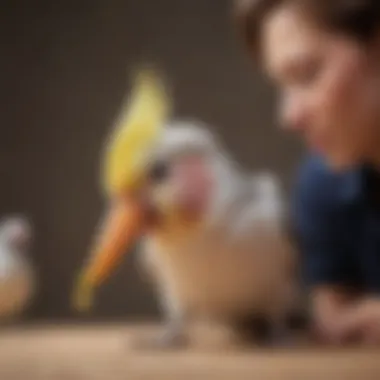
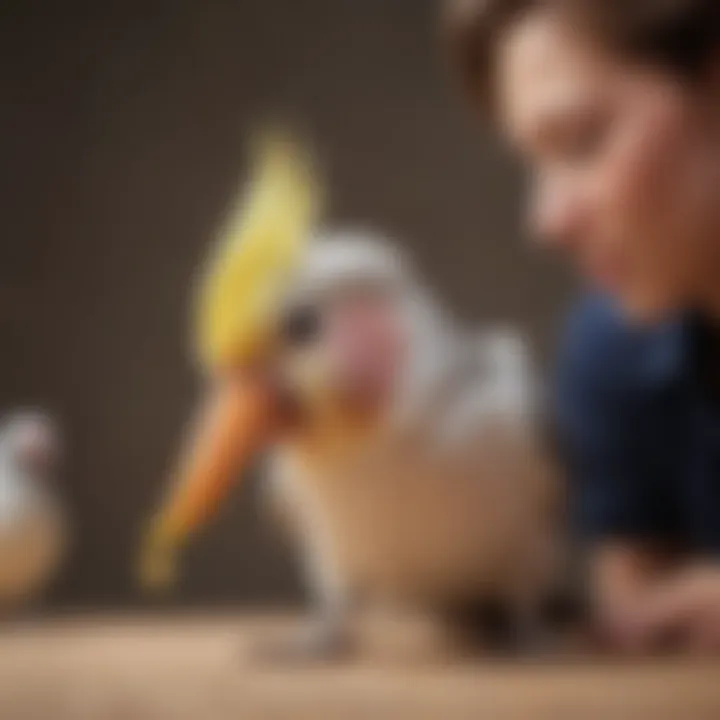
There are a few bath options available for cockatiels. You can use a suitable shallow dish filled with lukewarm water, or offer a mist spray. However, ensure that the water temperature is moderate as cockatiels can be sensitive to extreme heat or cold. Bathing should be a routine activity, ideally once or twice a week, depending on the individual bird's activity and environment.
Benefits of Bathing
- Cleanliness: Removes dirt and parasites, promoting healthier plumage.
- Skin Health: Helps to alleviate dryness and reduces the chances of skin infections.
- Behavioral Bonding: Cockatiels often enjoy bathing, and it can serve as an enjoyable interactive time with their owners.
Nail Clipping and Beak Care
Regular nail clipping and beak care are necessary components of cockatiel maintenance. Overgrown nails can lead to discomfort and mobility issues for the bird. Keeping nails trimmed prevents them from causing harm to both the bird and its environment. Care also extends to the beak, which requires attention to prevent overgrowth and associated health issues.
For nail clipping, it is advisable to use specialized bird nail clippers or human nail clippers with a gentle touch. Approach the task slowly, ensuring comfort for the cockatiel. Be careful to not cut too close to the quick, which can lead to bleeding. If you are uncertain, you can seek assistance from a veterinarian or an avian expert.
Beak Care
- Inspect Regularly: Look for changes or irregularities in shape or color.
- Chewing Opportunities: Provide wooden toys to help keep the beak trimmed naturally.
- Veterinary Advice: Seek professional evaluation if you notice signs of beak overgrowth or abnormalities.
Regular grooming not only enhances the physical appearance of cockatiels but also nurtures their mental well-being. Consistent attention to these grooming practices can fortify the bond between pet and owner, leading to a happy and healthy cockatiel.
By ensuring thorough grooming and maintenance routines, owners can support the health and happiness of their cockatiels effectively.
Behavioral Insights
Understanding the behavioral aspects of cockatiels is crucial for any owner seeking to optimize their pet's environment and interaction. Cockatiels, like many birds, display a variety of behaviors that reveal their needs, emotions, and health status. Insights into these behaviors help owners create more harmonious living situations. Being attuned to these nuances can significantly improve the quality of life for both the cockatiel and its owner.
Understanding Cockatiel Behavior
Cockatiels communicate through various signals, including vocalizations and body language. Knowing what these behaviors mean is key to fostering a healthy relationship. Here are several insights into common cockatiel behaviors:
- Vocalizations: Cockatiels are known for their vocal range which includes whistles, chatters, and squawks. Each sound can represent different feelings such as excitement, fear, or contentment. Listening closely to these sounds can help you gauge their mood.
- Body Language: The positioning of a cockatiel's body and feathers can communicate much. For example, raised feathers or an open beak may indicate excitement or nervousness, while a calm posture usually signifies relaxation.
- Social Interactions: Cockatiels are naturally social creatures. They thrive on interaction, either with humans or other birds. Observing how your cockatiel interacts during playtime or feeding provides insight into their social dynamics.
Recognizing such behaviors is essential for ensuring that a cockatiel feels secure and understood, which enhances the bond between pet and owner.
Addressing Behavioral Problems
Behavioral problems in cockatiels can arise from various sources such as stress, lack of socialization, or health issues. Identifying and addressing these problems proactively ensures a healthy and happy bird. Here are techniques to address common issues:
- Inspection for Health Issues: If your cockatiel exhibits sudden changes in behavior, consider consulting a vet. Illness can manifest in altered activity levels or social behaviors.
- Environmental Enrichment: Boredom is a common contributor to behavioral problems. Ensure that your cockatiel has access to toys, perches, and climbing structures.
- Consistent Routine: Establishing a reliable feeding and interaction schedule helps cockatiels feel secure. They thrive on predictability, so sudden changes can lead to anxiety.
- Positive Reinforcement: Utilize treats and praise to encourage good behavior. This creates a favorable association and fosters trust.
Cockatiels are social birds that require mental stimulation and interaction to thrive. Ignoring their need for engagement may lead to behavioral issues.
By understanding and addressing behavioral concerns, you can greatly enhance the relationship with your cockatiel, ensuring a content and well-adjusted pet. Keeping a keen eye on their behaviors will lead to proactive decisions that benefit both you and your feathered companion.
Traveling with Your Cockatiel
Traveling with your cockatiel can be a rewarding experience, but it does require careful planning. Understanding how to manage your pet's needs during trips is crucial. Cockatiels are sensitive animals. Their comfort and well-being should be the top priority. This section offers guidance on preparing for travel and ensures the safety of your cockatiel while on the move.
Preparing for Travel
When planning a trip with your cockatiel, several preparations are necessary. Start by assessing the total duration of your travel and the mode of transportation. A car ride is different from flying. Each mode has distinct requirements.
- Health Check: Schedule a veterinary visit beforehand. Ensure your bird is fit to travel. This is important, especially for long journeys.
- Familiar Items: Take familiar objects like toys, perches, and food bowls. These items will help reduce stress during the trip.
- Travel Carrier: Select a secure and comfortable travel carrier. Ensure it provides good ventilation and suitable space for your cockatiel. It should also allow them to move without feeling cramped.
- Packing Essentials: Pack their food, water, and any medications. Include a first aid kit specifically for birds.
- Plan Breaks: When traveling by car, plan for regular breaks. Allow your cockatiel to eat and drink. Let them stretch their wings briefly.
Safe Transport Methods
Once prepared, consider specific transport methods. The safety of your cockatiel during travel is non-negotiable.
- Car Travel: Always secure the carrier. Keep it stable to minimize movement. Avoid leaving your cockatiel in a hot or cold car, as extreme temperatures can be harmful.
- Air Travel: Research the airline's policies about pet travel. Some airlines allow cockatiels in the cabin while others may require them in the cargo hold. Ensure your carrier meets the airline's specifications.
- Public Transport: Check transport regulations for pets. Some buses or trains allow pets, while others do not. Keep your cockatiel in a secure carrier during the journey.
Traveling with a cockatiel requires proper planning and consideration for their welfare. Your attention to detail can help prevent stress for both you and your pet.
By preparing well and choosing safe methods of transport, you ensure a comfortable experience for your cockatiel. This strengthens your bond, making travel a shared adventure.
Creating a Safe Environment
Establishing a secure environment for your cockatiel is fundamental for its overall well-being. This topic is crucial as cockatiels, being inquisitive and active birds, can easily encounter dangers within your home. An unsafe environment may lead to injuries, health issues, or escape. By being proactive about safety, you foster a space that supports your bird’s mental and physical health, allowing it to thrive in your care.
Identifying Hazards in the Home
Recognizing potential hazards in your home is the first step towards creating a safe environment for your cockatiel. Common hazards include:
- Toxic Plants: Several indoor plants, like pothos and philodendrons, are poisonous to birds. It is essential to research or consult a list of safe plants before introducing any green life to your living space.
- Small Objects: Items like rubber bands, string, and small toys can be choking hazards. Birds often chew and ingest these items, leading to serious health problems.
- Open Windows and Doors: Cockatiels are natural fliers and may try to escape if a window or door is left open. Ensure that these openings are secured with screens or closed at all times.
- Electrical Cords: Exposed wires and cords can be enticing for curious birds. Covering and securing these cords helps prevent chewing, which can lead to electrical shock or burns.
By identifying and mitigating these hazards, you take a significant step toward ensuring the safety of your cockatiel.
Pet-proofing Your Space
To further enhance the safety of your home for your cockatiel, pet-proofing is essential. Here are some strategies:
- Secure cages: Ensure that your cockatiel's cage is sturdy and free from any sharp edges or gaps where it could get stuck.
- Remove harmful items: Store cleaning supplies, medications, and any materials like heavy-duty plastic bags in cabinets away from your bird's reach.
- Establish a safe flying area: If you allow your cockatiel out of its cage, designate a flying area free from hazards. Make sure to remove any delicate or dangerous items from that space.
"Creating a safe environment is not just about protecting them, but also about enabling them to explore and interact without fear."
- Use bird-safe materials: When choosing décor or materials for your home, ensure they are non-toxic. Natural woods are generally safer than treated woods for your cockatiel.







